A Brief Colonial History Of Ceylon(SriLanka)
Sri Lanka: One Island Two Nations
A Brief Colonial History Of Ceylon(SriLanka)
Sri Lanka: One Island Two Nations
(Full Story)
Search This Blog
Back to 500BC.
==========================
Thiranjala Weerasinghe sj.- One Island Two Nations
?????????????????????????????????????????????????Friday, September 4, 2020
As Belarus protests, Ukraine’s civil society reacts - with solidarity
Hosting Belarusians at their homes, documenting police violence and organising solidarity actions - Ukrainian civil society has reacted quickly to events in Belarus.
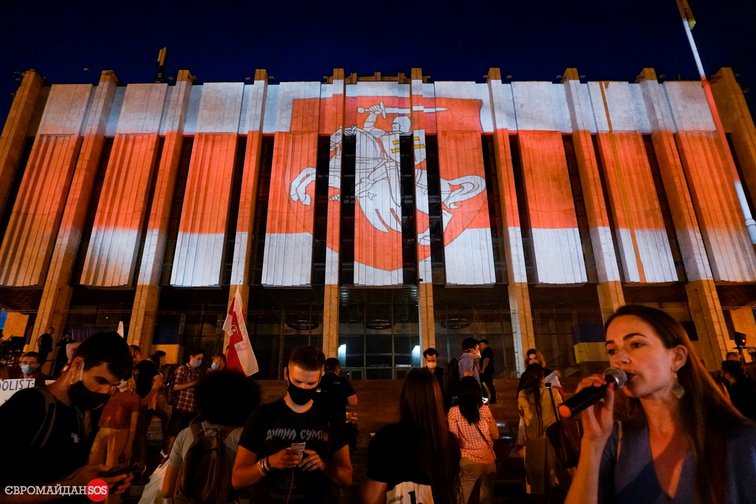 |
Grigory Pyrlik-3 September 2020
“When I was in the 11th grade, I realised that I had no future in Belarus,” says Anastasia Dykova.
Originally from Minsk, Dykova is speaking outside the Ukrainian House - lit up in the red and white of the unofficial Belarusian flag - in central Kyiv.
“I had no freedom of expression, my vote wouldn’t count for anything at elections, and so I couldn’t live there,” she continues. “There have been no changes in the country for 26 years. And this is why we chose the 26th of August for our action - in defence of human rights, and to help stop the violence in Belarus.”
Participants of the #BelarusWatch international initiative organised the light projection in solidarity with protesters in Belarus - similar events took place in a number of Ukrainian cities, as well as 15 countries around the world. Anastasia Dykova helped organise the international event in Kyiv - 30 years old, she’s lived in Ukraine for 13 years - and her speech is followed by rights defenders, activists and Ukrainians MPs. Speaking to a small crowd on 26 August, they propose how the Ukrainian authorities should react to events in Belarus.
As protests broke out in Belarus over falsified election results and police violence last month, Ukrainian civic activists have reacted quickly - hosting people leaving the country in fear of persecution, organising solidarity actions and helping to document instances of state violence. The Ukrainian authorities, meanwhile, initially played a waiting game - before choosing not to recognise the results.
Criminal cases
Belarusian rights defender and activist Andrej Stryzhak entered Ukraine at the start of July. At home, Andrej had helped found BYCOVID-19, an initiative to collect funds and resources for doctors fighting the coronavirus epidemic. He believes that it was not safe for him to stay in the country.
“One of the reasons behind the protests is Lukashenka’s attitude to coronavirus,” Stryzhak tells me. “Every person values their own life. And when you’re told that coronavirus is a load of rubbish, that if you fall ill, then you cure yourself by driving tractors and feeding goats, people started thinking that something is definitely wrong. What was he going to do next, ‘cancel’ coronavirus when there was another outbreak?
“I worked on [the BYCOVID-19] campaign, I was active in a load of other areas. And people who knew the situation told me that my name was coming up far too often in certain offices, and that it would be better if it didn’t. When several sources informed me about this, I realised that I should get abroad. Especially seeing as I had had coronavirus myself, and I was still recovering from it.”
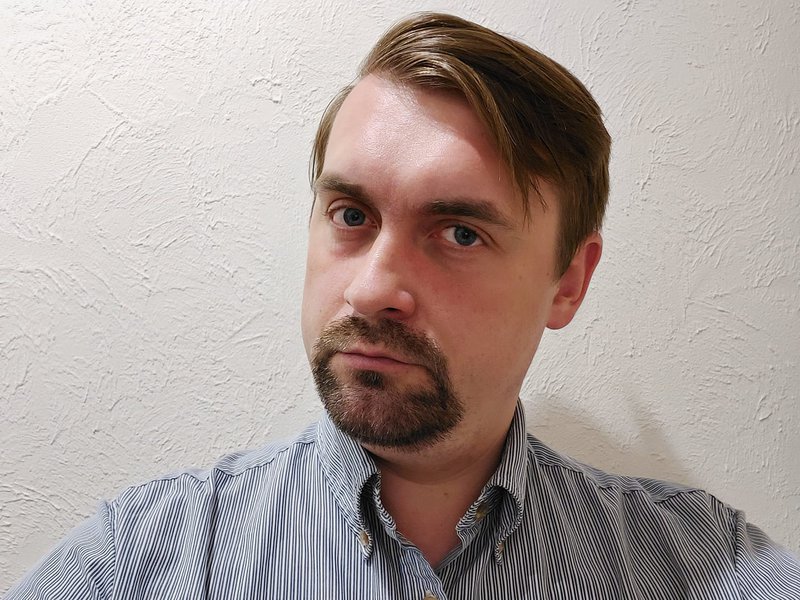 |
| Add caption |
Stryzhak now has another reason not to return to Belarus. In August, he joined the Belarusian opposition’s Coordination Council, which was quickly targeted by the country’s Investigative Committee over allegations of an attempted coup. Council members are currently being questioned as witnesses.
“Being a witness is the most dangerous status in Belarusian law,” Stryzhak continues. “You don’t have the right to refuse to give evidence. In that sense, it’s simpler being a suspect, as you can just say: ‘We’ll talk in court.’ The Belarusian state has left legality behind. There’s yet to be a single investigation into the beating of protesters, but there’s a dozen investigations into violence against police officers.”
Stryzhak does not know when he will return to Belarus. He says that he will find himself in Ukraine - he can do some of his work long-distance, and he hasfriends here. Being a volunteer, Andrej previously collected donations for combat medics and residents of Ukraine’s frontline territories. He believes that other Belarusians could find it much more difficult to find their place in Ukraine.
Borders and migration
At midnight on 28 August, Ukraine closed its borders for foreign citizens in connection with the Coronavirus outbreak. Only transit passengers, immediate relatives and people with work or residency permits can enter the country.
Interior Minister Arsen Avakov stated that the authorities will make an exception for Belarusian citizens - the head of Ukraine’s border service can decide whether to permit their entry. On 27 August, Tut.by reported that several Belarusians had not been permitted to enter Ukraine.
Both Belarusian and Ukrainian activists have called on the Ukrainian authorities to keep the border open for Belarusians. Andrej Stryzhak explains that Belarusians need visas for Latvia, Lithuania and Poland, but only a passport for foreign travel is needed to enter Ukraine. It’s unclear how many people have left the country so far.
Vostok SOS, a Ukrainian civic initiative initially set up in 2014 to help people affected by the war, has started helping Belarusians who have left for Ukraine. Now the organisation is collecting information about Ukrainian citizens who are ready to help Belarusians. The organisation’s executive director Oleksandra Dvoretska cites examples of people who have come to Ukraine.
“There are families of people who administer [Belarusian] Telegram channels who are now under pressure,” Dvoretska says. “We met one of these families at Borispil airport, and then took them to an apartment where they’re living now. There are law enforcement officers who refused to obey orders and resigned, they didn’t want to participate in the violence. And these people face a double risk: first, they can testify that there were illegal orders to use maximum cruelty against protesters. Second, they supported the protests, and therefore at risk.”
“There are law enforcement officers who refused to obey orders and resigned [...] These people face a double risk: first, they can testify that there were illegal orders to use maximum cruelty against protesters. Second, they supported the protests”
Pavlo Kaliuk, a civic activist and co-founder of a neighbourhood initiative in Kyiv’s historic Podil district, called on city residents to host people from Belarus. Kalyuk tells me Belarusians are leaving the country for other reasons aside from the protests.
“There are businessmen, people in IT for whom the internet blocks became an important reason to leave the country. I didn’t talk to them about the political reasons behind their leaving. People just don’t feel safe, for different reasons,” he says.
Around 20 people responded to Kalyuk’s request on Facebook, and I spoke to one of them, Anastasia Bondarenko, who rents a one-room apartment in the city. She still agreed to host two people at her flat. “We helped one another during Maidan,” Bondarenko tells me. “I was living in Kharkiv back then. We would come to Kyiv, stay at a girl’s house - I didn’t even know her. It was a two-room apartment, and there were eight of us.”
Natalia Kurchenko, director of a creative agency, also offered to help host Belarusians coming to Kyiv. Born in Ukraine, Natalia lived in Russia until 2014 and moved to Ukraine on her Russian passport. Now she watches livestreams from Minsk and other cities constantly - and thinks about her country of citizenship.
“Belarus lives in roughly the same kind of hard authoritarian, despotic regime that Russia does,” she says. “We should hate the regime of Lukashenka just as fiercely as we hate the Putin regime. I have some Belarusian friends, and I know from them what’s happening inside the country. Including the level of dissatisfaction: how that beautiful picture [of Belarus], with its clean streets, doesn’t make life any easier. I can’t stand that awful Soviet atmosphere.”
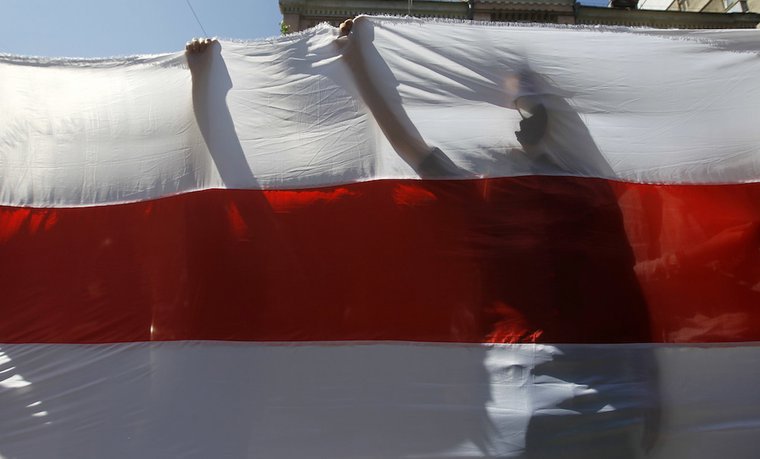 |
| Add caption |
According to Oleksandra Dvoretska, there will probably not be more than a few hundred people forcibly displaced from Belarus who come to Ukraine. But even those who do cross the Ukrainian border could face problems, says Andrej Stryzhak.
First, he says, their arrival coincides with “high season” on the rental market, when people return from holidays, students travel for the start of semesters and it’s hard to find apartments. Second, Belarusians will need legal assistance to navigate the intricacies of Ukraine’s migration legislation and the procedures for acquiring Ukrainian documents. Third, families will need to get their children into schools. At both the central and local levels, the Ukrainian authorities are yet to make statements about assistance for Belarusian migrants.
Documenting violence
During the 2014 revolution, Maria Nazarova was a volunteer with the Maidan medical service - she then went through tactical medicine courses, was involved in reforming healthcare provision in Ukraine’s armed forces, and led an initiative in support of installing defibrillators in Kyiv’s metro stations. As evidence of the Belarusian police’s brutality began to emerge in the aftermath of the election, Nazarova and another former Maidan medical service volunteer, Olha Khudetska, published their advice on first aid treatment for Belarusian protesters - how to organise a field hospital, document injuries and treat injuries.
“The Belarusian security forces use different flash and gas grenades,” Nazarova says. “We believe they cause greater damage on explosion, but the powder component is most likely the same [as in Ukraine]. We didn’t have the number of car accidents provoked by the security forces. In Belarus, law enforcement are specially directing cars at crowds of protesters, knocking people down, which leads to very serious injuries.”
Oleksandra Matviychuk, head of Ukraine’s Center for Civil Liberties, has focused on a different aspect of the mass violence in Belarus. She is helping to document the Lukashenka regime’s crimes.
“We’re collecting photos and videos that we find on the internet,” she tells me. “We know that they’ll disappear after a time. But there are volunteers who responded to the #BelarusWatch initiative and are creating a database. We’ll give it to Belarusian human rights organisations who will have to conduct an investigation of crimes in Belarus.”
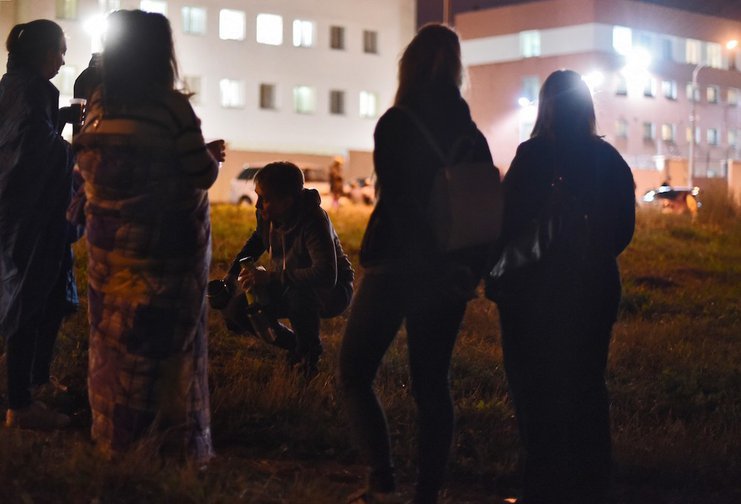 |
| Add caption |
Matviychuk believes that these materials will also help international courts and law enforcement. “Everything that is happening in Belarus has to be given a legal evaluation - detention without cause, torture, violent disappearances, disproportionate use of force,” she says. “International organisations have a whole range of special rapporteurs or mechanisms, whose powers cover investigations into these events.”
The Center for Civil Liberties is looking for volunteers who can help collect information about possible crimes in Belarus - the initiative is currently limited to basic descriptions of photos and videos. For example, if a photo shows a police officer beating a medic, then the Ukrainian rights defenders attach the description to the image - but their Belarusian colleagues will establish who exactly the video shows.
A common past?
Oleksiy Haran, Research Director at the Democratic Initiatives Foundation and professor of political science at Kyiv Mohila Academy, is following the Belarusian protests as both a citizen and researcher. He sees some commonalities between Ukraine’s revolution and the stage of the current Belarusian protests.
“The national flag is currently being rehabilitated in Belarusian society,” Haran says. “There’s a certain similarity with Ukraine here: before 1988, Ukraine’s blue and yellow flag wasn’t recognised. But since 1989, all democratic protests have been held under it, it has been legimitised. Now people defend Ukraine’s independence under this flag. It’s the same with Belarus’ white-red-white flag: it’s becoming a symbol of freedom. For me it’s completely clear that this flag will replace Belarus’ flag, which is basically Soviet.”
Citing the experience of Maidan, Haran believes that Belarus’ leaderless protest is not a cause for concern over its success. He says that EuroMaidan also lacked a single leader. He also observes that the protests in Ukraine in 2014 were not anti-Russian from the start. “Prior to 2014, NATO supporters in Ukraine were in the minority. Now they’re the majority. Right now in Belarus many people believe in a union with Russia, but much will depend on Russia’s reaction. If Russia choses to support Lukashenka directly, it will start to lose.”
There are yet to be any polls held on Ukrainian society’s support for the protests in Belarus, but it’s clear that there are people who support the Belarusian authorities. In 2019, the Rating sociological group conducted a poll which found that, for respondents, Alyaksandr Lukashenka was the most popular leader - 66% of respondents viewed him positively, and 15% negatively; according to the same poll, Angela Merkel received 60% and 17%, Andrzej Duda - 48% and 9%.
Related story
“The fact that Lukashenka ranked first is the result of an organised campaign to persuade society by pro-government television channels under Leonid Kuchma and Viktor Yanukovych, and now TV channels belonging to Medvedchuk,” Haran says, referring to Viktor Medvedchuk, head of the political council of the pro-Russian Opposition Platform - For Life party.
“These TV channels always said that what people need is stability, and that ‘Maidans’ are harmful,” Haran continues. “On the outside, Belarus looked stable. Obviously experts, political scientists epxlained that this is autarchy, that the country survives on Russian subsidies, that money is made via contraband schemes, on the allegedly non-existent border with Russia.”
Official response
Standing outside the Ukrainian House on 26 August, Kira Rudyk, head of the Voice political party, covers her shoulders with the white-red-white Belarusian flag. On 10 August, Rudyk’s party had called on their colleagues in the Ukrainian parliament not to recognise the reults of the Belarusian elections. In their draft resolution, the party had also called on Lukashenka to stop the violence against protesters. But MPs are yet to vote on the resolution. Dmytro Razumov, Ukraine’s parliamentary speaker, explained that representatives of parliamentary groupings should first agree the wording.
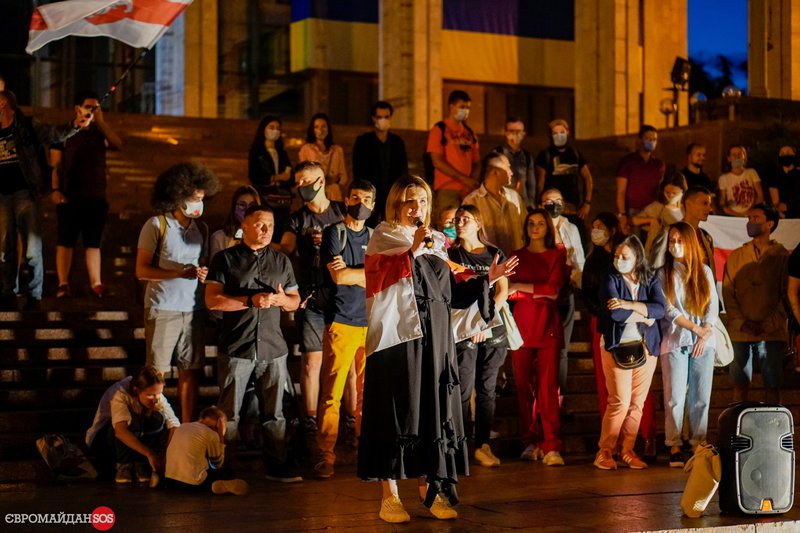 |
| Add caption |
But Ukraine’s parliament is home to another strain of opinion. That same day, Yevhen Shevchenko, an MP with Servant of the People - the party of president Volodymyr Zelenskyi - congratulated Belarusian president Alyaksandr Lukashenka on the latter’s victory at the presidential elections. “I haven’t seen a single Belarusian who would say that they are against Lukashenka,” Shevchenko declared.
Initially, Ukraine’s Foreign Ministry reacted with restraint to the election results. On 15 August, the ministry released a statement saying that “the officially published presidential election results in the Republic of Belarus do not inspire confidence in Belarusian society”. The ministry also expressed hope that the release of at least some of the protesters would become the start of a dialogue between the authorities and civil society.
“Ukraine refrained from any mention of falsifications at the elections, called on Belarusian society to compromise and didn’t even call for the swift release of thousands of detained protesters”
The Ukrainian Foreign Ministry’s position has been criticised by experts, including Serhiy Sidorenko, editor of the European Truth media outlet.
“The Foreign Ministry’s statement appeared closer to the position of official Minisk than the international community,” he wrote. “In it, Ukraine refrained from any mention of falsifications at the elections, called on Belarusian society to compromise and didn’t even call for the swift release of thousands of detained protesters, but instead expressed satisfaction that Lukashenka had released a few detainees.”
On 27 August, it became clear that Kyiv had opted not to recognise Lukashenka as the elected president of Belarus, joining the European Union’s statement that the election process did not meet international standards. Foreign Ministry Dmytro Kuleba stated that all official contacts with Belarus had been paused.
Writing for Zmina human rights portal, Oleksandra Dvoretska believes that the Ukrainian state’s position on Belarus should be more active. She wants Ukraine’s education ministry to propose programmes for Belarusian students who cannot finish their studies at home due to their participation in the protests - Poland has already proposed a similar programme. Dvoretska also insists that school pupils from Belarus should be able to study in Ukrainian schools, calling on Ukraine’s border and migrant services not to hinder Belarusians from entering the country.
So far, the burden of helping Belarusian protesters has fallen on Ukrainian civil society and activists - neither the country’s central, nor local authorities are yet to propose any initiatives.

